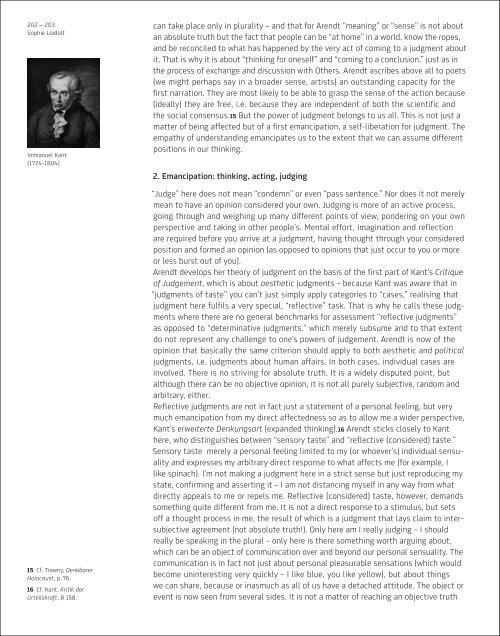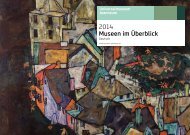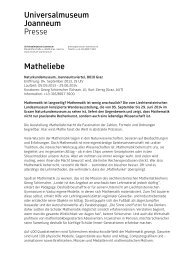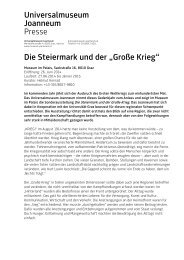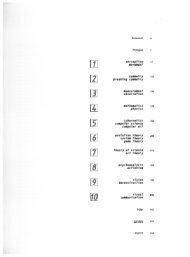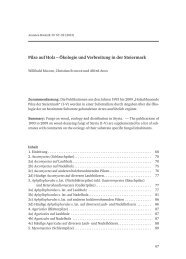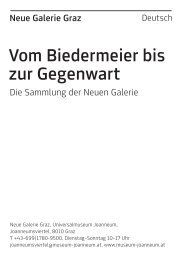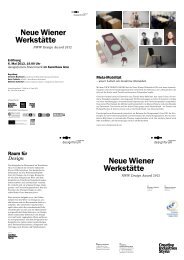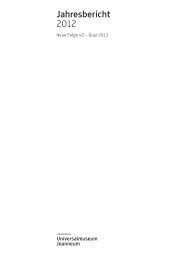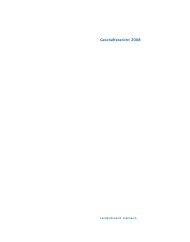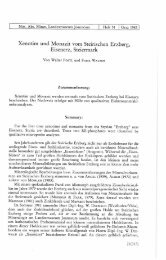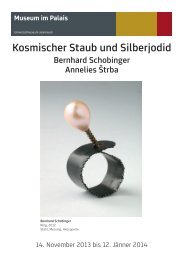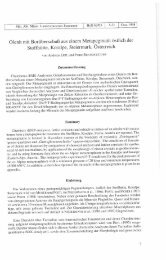Human Condition - Universalmuseum Joanneum
Human Condition - Universalmuseum Joanneum
Human Condition - Universalmuseum Joanneum
Erfolgreiche ePaper selbst erstellen
Machen Sie aus Ihren PDF Publikationen ein blätterbares Flipbook mit unserer einzigartigen Google optimierten e-Paper Software.
202 — 203<br />
Sophie Loidolt<br />
Immanuel Kant<br />
(17241804)<br />
15 Cf. Trawny, Denkbarer<br />
Holocaust, p. 76.<br />
16 Cf. Kant, Kritik der<br />
Urteilskraft, B 158.<br />
can take place only in plurality – and that for Arendt “meaning” or “sense” is not about<br />
an absolute truth but the fact that people can be “at home” in a world, know the ropes,<br />
and be reconciled to what has happened by the very act of coming to a judgment about<br />
it. That is why it is about “thinking for oneself” and “coming to a conclusion,” just as in<br />
the process of exchange and discussion with Others. Arendt ascribes above all to poets<br />
(we might perhaps say in a broader sense, artists) an outstanding capacity for the<br />
first narration. They are most likely to be able to grasp the sense of the action because<br />
(ideally) they are free, i.e. because they are independent of both the scientific and<br />
the social consensus.15 But the power of judgment belongs to us all. This is not just a<br />
matter of being affected but of a first emancipation, a selfliberation for judgment. The<br />
empathy of understanding emancipates us to the extent that we can assume different<br />
positions in our thinking.<br />
2. Emancipation: thinking, acting, judging<br />
“Judge” here does not mean “condemn” or even “pass sentence.” Nor does it not merely<br />
mean to have an opinion considered your own. Judging is more of an active process,<br />
going through and weighing up many different points of view, pondering on your own<br />
perspective and taking in other people’s. Mental effort, imagination and reflection<br />
are required before you arrive at a judgment, having thought through your considered<br />
position and formed an opinion (as opposed to opinions that just occur to you or more<br />
or less burst out of you).<br />
Arendt develops her theory of judgment on the basis of the first part of Kant’s Critique<br />
of Judgement, which is about aesthetic judgments – because Kant was aware that in<br />
“judgments of taste” you can’t just simply apply categories to “cases,” realising that<br />
judgment here fulfils a very special, “reflective” task. That is why he calls these judgments<br />
where there are no general benchmarks for assessment “reflective judgments”<br />
as opposed to “determinative judgments,” which merely subsume and to that extent<br />
do not represent any challenge to one’s powers of judgement. Arendt is now of the<br />
opinion that basically the same criterion should apply to both aesthetic and political<br />
judgments, i.e. judgments about human affairs. In both cases, individual cases are<br />
involved. There is no striving for absolute truth. It is a widely disputed point, but<br />
although there can be no objective opinion, it is not all purely subjective, random and<br />
arbitrary, either.<br />
Reflective judgments are not in fact just a statement of a personal feeling, but very<br />
much emancipation from my direct affectedness so as to allow me a wider perspective,<br />
Kant’s erweiterte Denkungsart (expanded thinking).16 Arendt sticks closely to Kant<br />
here, who distinguishes between “sensory taste” and “reflective (considered) taste.”<br />
Sensory taste merely a personal feeling limited to my (or whoever’s) individual sensuality<br />
and expresses my arbitrary direct response to what affects me (for example, I<br />
like spinach). I’m not making a judgment here in a strict sense but just reproducing my<br />
state, confirming and asserting it – I am not distancing myself in any way from what<br />
directly appeals to me or repels me. Reflective (considered) taste, however, demands<br />
something quite different from me. It is not a direct response to a stimulus, but sets<br />
off a thought process in me, the result of which is a judgment that lays claim to intersubjective<br />
agreement (not absolute truth!). Only here am I really judging – I should<br />
really be speaking in the plural – only here is there something worth arguing about,<br />
which can be an object of communication over and beyond our personal sensuality. The<br />
communication is in fact not just about personal pleasurable sensations (which would<br />
become uninteresting very quickly – I like blue, you like yellow), but about things<br />
we can share, because or inasmuch as all of us have a detached attitude. The object or<br />
event is now seen from several sides. It is not a matter of reaching an objective truth


